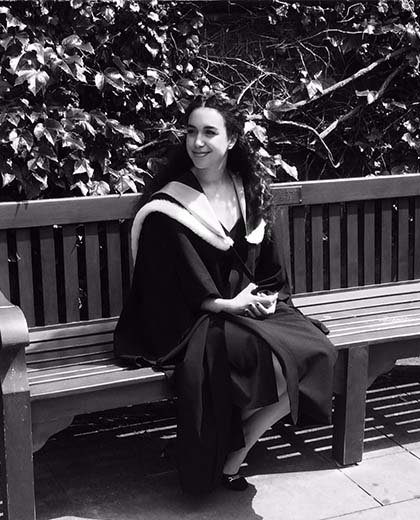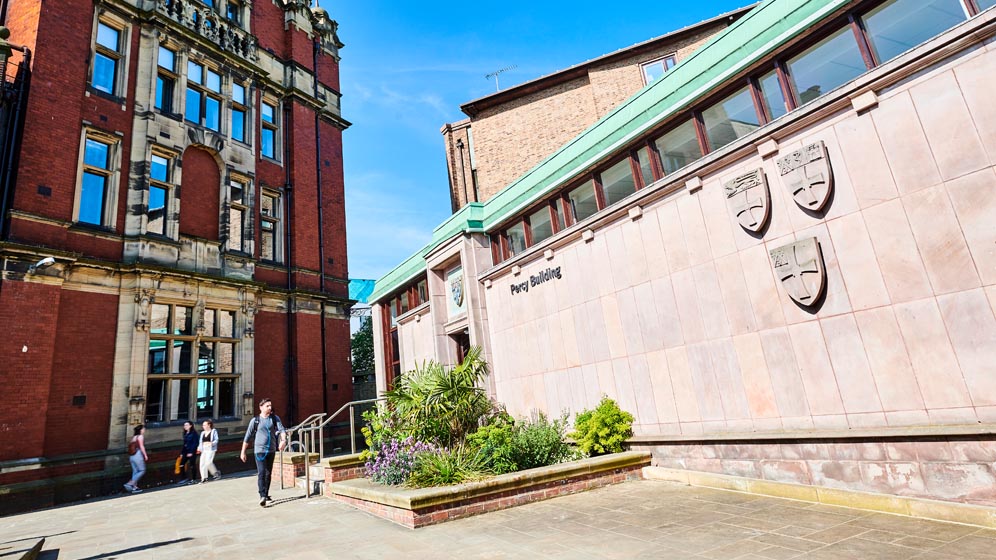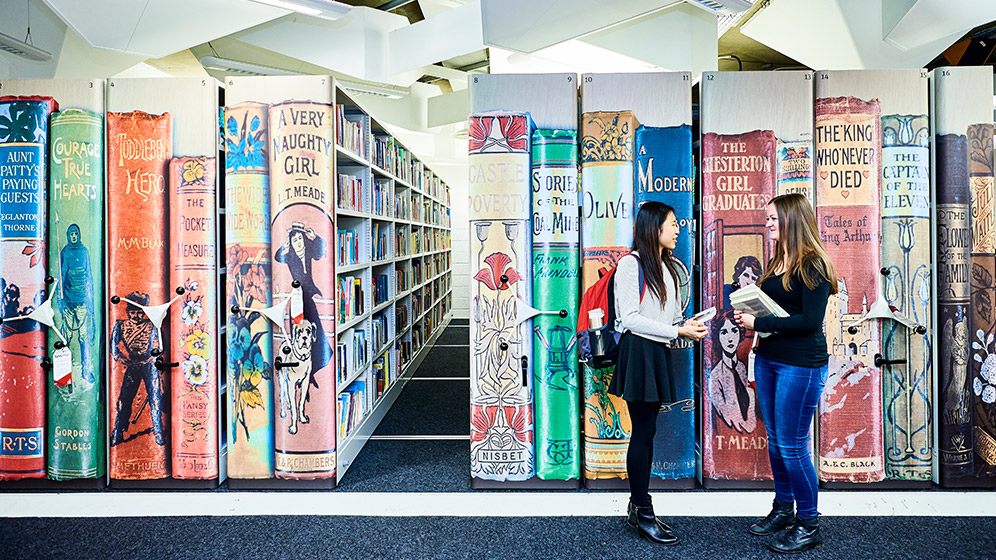English Language and Literature BA Honours
- UCAS code: Q300
- Full time
- 3 years
Immerse yourself in the literary and linguistic study of language as part of a wide-ranging degree in an inspiring city.
You are currently viewing course information for entry year: 2026
Next start date:
- September 2026
UCAS Institution name and code:
- NEWC / N21
Course overview
Develop your literary and linguistic knowledge on our English Language and Literature BA Honours degree. This joint honours degree will help you understand how the two disciplines complement each other.
You’ll learn from world-leading experts in everything from language and ageing to the Victorian novel.
Combine a variety of different modules throughout your course. You can:
- study child language acquisition alongside children’s literature
- explore the development of English while diving into heroic sagas
- examine dialects and the poetry of Robert Burns
You’ll then use everything you’ve learnt to undertake independent research on a topic of your choice.
At the end of your degree, you’ll have highly specialised knowledge in English Language and Literature. You'll also have a huge range of skills, covering everything from transcription and annotation to archival research and persuasive argument.
Your course and study experience - disclaimers and terms and conditions
Please rest assured we make all reasonable efforts to provide you with the programmes, services and facilities described. However, it may be necessary to make changes due to significant disruption, for example in response to Covid-19.
View our Academic experience page, which gives information about your Newcastle University study experience for the academic year 2025-26.
See our terms and conditions and student complaints information, which gives details of circumstances that may lead to changes to programmes, modules or University services.
Quality and ranking
Professional accreditation and recognition
All professional accreditations are reviewed regularly by their professional body.
Modules and learning
Modules
The information below is intended to provide an example of what you will study.
Most degrees are divided into stages. Each stage lasts for one academic year, and you'll complete modules totalling 120 credits by the end of each stage.
Our teaching is informed by research. Course content may change periodically to reflect developments in the discipline, the requirements of external bodies and partners, and student feedback.
Optional module availability
Student demand for optional modules may affect availability.
Full details of the modules on offer will be published through the Programme Regulations and Specifications ahead of each academic year. This usually happens in May.
To find out more please see our terms and conditions
You will build the foundations for the theoretical and historical study of language and literature.
You'll study half of your topics in English language and half in literature.
In your language modules, you'll be introduced to general topics on the nature of language and more specific ones, such as the investigation of regional dialects and other kinds of language variation.
Literature modules will provide you with an overview of the development of English literature through time and across cultures.
Modules
Your language modules give you the option to develop different aspects of your knowledge of the structure of English, the history of the English language, the social contexts in which English is used, and scientific methodologies for studying these phenomena.
In literature, you take at least one pre-19th-century topic alongside a more contemporary one. A range of topics are available, including: Renaissance literature; Romantic literature; the Victorians; 20th-century British and American modernism; post-war and contemporary culture; drama; children’s fiction; postcolonial literature; film modules; and creative writing.
Modules
You only take one of the following modules if you undertake the Study Abroad exchange programme:
At Stage 3, module options relate to your lecturers' specialisms, allowing you to explore some of the topics in language and literature studied at Stage 2 in more depth, and giving you the opportunity to develop your specialist interests.
You will also undertake a dissertation project; leading your own research in close collaboration with a faculty supervisor.
Modules
We base these figures and graphs on the most up-to-date information available to us. They are based on the modules chosen by our students in 2024-25.
Teaching time is made up of:
- scheduled learning and teaching activities. These are timetabled activities with a member of staff present.
- structured guided learning. These are activities developed by staff to support engagement with module learning. Students or groups of students undertake these activities without direct staff participation or supervision
Teaching and assessment
Teaching methods
You can normally expect to spend around 10 hours per week attending lectures, seminars, workshops and film screenings. You also spend around 25 hours per week on class preparation, reading, writing, and other kinds of independent research recommended by your tutor.
Assessment methods
You'll be assessed through a combination of:
-
Assignments – written or fieldwork
-
Coursework
-
Dissertation or research project
-
Essays
-
Examinations – practical or online
-
Group work
-
Interviews
-
Presentations
-
Projects
-
Reflective report/journal
Skills and experience
Practical experience
All our modules offer practical experience. In language and linguistics, this might take the form of data collection and analysis. In literary studies, this might include archival and editing work.
When you study English at Newcastle, you will also benefit from regular field trips organised by the School. These include visits to:
- The Wordsworth Trust (Dove Cottage)
- Lindisfarne
- various city theatres such as Northern Stage, Live Theatre, and Theatre Royal
- Seven Stories (the National Centre for Children's Books)
- Beamish Museum
- the Great North Museum
Research skills
For your independent study module at Stage 3, you can choose to complete a dissertation or extended research project, investigating a topic that you are passionate about.
There will also be opportunities to participate in staff research projects. Though this is not a four-year degree generally, some students do a placement year.
Opportunities
Study abroad
You can study abroad for one semester in your second year as part of this degree. In Europe we have links with:
- Ghent University, Belgium
- Leipzig University, Germany
- Groningen University, Netherlands
- Radboud University Nijmegen, Netherlands
We also have links with universities in other parts of the world, including Australia, Brazil, Canada, Hong Kong, Singapore, South Korea and the USA, including, but not limited to:
- Monash University, Australia
- University of Sydney, Australia
- McGill University, Canada
- University of Hong Kong
- University of Vermont, USA
Find out more about Study Abroad.
Work placement
During your degree, you’ll have multiple opportunities to undertake a meaningful work placement. In your second and third years, you may choose to take the Career Development Module which offers academic credit for 50 hours of placement. You can choose to carry out your placement via part-time work, volunteering, or in a local school. You will be assessed through a mixture of written work, presentations, and professional skills assessment.
In addition, you'll have the option to spend 9 to 12 months on a work placement. You will receive University support from our dedicated Careers team to help you secure your dream placement in the UK or abroad. Work placements take place between stages 2 and 3.
You'll gain first-hand experience of working in a sector, putting your learning into practice, and developing your professional expertise. Previous placements have been in a range of sectors, including:
- journalism and broadcasting
- sustainable energy
- politics
- digital media and marketing
- education
- finance
- museum and heritage
- travel and tourism
If you choose to take a work placement, it will extend your degree by a year. Placements are subject to availability.
Facilities and environment
Facilities
You'll be based in the School of English Literature, Language and Linguistics. The School is located in the Percy Building, which is at the heart of our city-centre campus. You'll join a lively community of students, academics, writers, and professionals.
You'll have access to:
- a library of 1.4 million books and 54,000 journals on 26km of shelving
- the Percy Building’s student common rooms, study areas and café
- Northern Stage, Great North Museum & the Hatton Gallery for events and exhibitions
- the Students' Union for shops, societies and gigs
- a digital media lab for developing documentaries and film-making
- the School of Modern Languages’ Language Resource Centre
You'll also have access to a diverse programme of events, including spoken-word events and creative writing courses.
Find out more about the School of English Literature, Language and Linguistics
Support
You'll have the support of an academic member of staff as a Personal Tutor throughout your degree to help with academic and personal issues affecting your academic progress.
Peer Mentors will help you in your first year. They are fellow students who can help you settle in and answer questions you may have when starting university.
Your future
English Language and Literature students acquire a range of valuable skills which equip them to pursue diverse career paths.
Your training can be used in:
- teaching English as a foreign language
- publishing and journalism
- advertising, branding and marketing
- law and policy
- information services and data science
You will gain skills such as critical reasoning and problem solving, project and data management, oral and written communication, collaboration and independent research.
Our degrees provide excellent preparation for a wide number of professions. With further training, our graduates have also become:
- lexicographers
- translators and interpreters
- speech and language therapists
- social researchers
- legal sector workers (including forensic linguists)
Employability
Employability and the engagement with the wider world go hand-in-hand in this degree.
Many of our modules, particularly in Stage 3, model their assessments on the kind of tasks you might be employed to do:
- constructing marketing briefs
- summarising reports
- drafting website copy
- curating exhibitions
- designing experiments
- coding websites
- analysing data
- writing a clear and persuasive argument
Beyond our modules, there are plenty of extracurricular opportunities. These range from freelance work for Newcastle’s student newspaper to paid internships in the department. In particular, the Newcastle Centre for Literary Arts hires students to work on everything from event management to app design.
Students with this degree get a range of valuable skills, which they can transfer to many different sectors. Your literary training can be used in journalism, librarianship, teaching and the highly competitive fields of writing, acting, and directing. Our graduates have also gone into a variety of career areas including marketing, law, politics, and human resources.
Industry links
English graduates from Newcastle University include:
- Peter Straughan (screenwriter of Tinker, Tailor, Soldier, Spy)
- Andy Bird (former chairman of Walt Disney International)
- Neil Astley (writer and founder of Bloodaxe publishing house)
- Teresa Graham (accountant and SME champion, awarded a CBE in 2007 and an OBE in 1997)
Sorry, you need JavaScript to view this video
Make a difference
Sorry, you need JavaScript to view this video
Follow in their footsteps

- Name: Khadija
- Nationality: British
- Graduated: 2016
- Now working as: Community Engagement Manager at National Institute for Health and Care Research
"There are many elements to the English Language degree, so you can tailor it to your interests. I was interested in the social aspects of the language and the ways it links to social justice and equality, which is what my career focuses on."
Find out what Khadija liked the most about studying English Language at Newcastle University and how this degree helped her in her career.
Careers support
Our Careers Service is one of the largest and best in the country, and we have strong links with employers. We provide an extensive range of opportunities to all students through our ncl+ initiative.
Visit our Careers Service website
Recognition of professional qualifications outside of the UK
If you’re studying an accredited degree and thinking about working in Europe after you graduate, the best place to find current information is the UK Government’s guidance on recognition of UK professional qualifications in EU member states. This official resource explains whether your profession is regulated in another country, what steps you need to take, and which organisation you should contact.
Entry requirements
All candidates are considered on an individual basis and we accept a broad range of qualifications.
The entrance requirements and offers below apply to 2026 entry.
| A-Level | |
|---|---|
| International Baccalaureate | |
|---|---|
Other UK and the Republic of Ireland qualifications
Alternative offers at Newcastle
Through one of our contextual or alternative offer routes, you could receive an offer of up to three grades lower than the typical requirements.
Contextual offers
We use certain contextual data from your UCAS form, alongside your application, to consider challenges that you may have faced in your education and the potential effect this may have had on your qualifications. This means you may be eligible to receive a lower contextual offer.
PARTNERS offers
One of the largest and longest support entry routes to university of its kind for students from underrepresented backgrounds. We support applicants from application through to study.
Realising Opportunities offers
A unique programme delivered in collaboration with 10 leading, research-intensive universities in the UK. The programme is open to students in Year 12/first year of college.
Pathways to Newcastle offers
Pathways to Newcastle, our national skills entry route, is available for specific subject areas.
High Performance Athletes
We support promising athletes at the application stage, who compete in regional, national or international levels in their sport.
Qualifications from outside the UK
English Language requirements
Entrance courses (INTO)
International Pathway courses are specialist programmes designed for international students who want to study in the UK. We provide a range of study options for international students in partnership with INTO.
These courses are specifically designed for international students who want to study in the UK and progress onto one of our undergraduate degrees. Our International Study Centre, has a range of study options including:
- International Foundation
- International Year One
- English Language courses
Find out more about International Pathway courses
Admissions policy
This policy applies to all undergraduate and postgraduate admissions at Newcastle University. It is intended to provide information about our admissions policies and procedures to applicants and potential applicants, to their advisors and family members, and to staff of the University.
University Admissions Policy and related policies and procedures
Credit transfer and Recognition of Prior Learning
Recognition of Prior Learning (RPL) can allow you to convert existing relevant university-level knowledge, skills and experience into credits towards a qualification. Find out more about the RPL policy which may apply to this course.
Tuition fees and scholarships
Tuition fees for academic year 2026-2027
The 2026 entry home fees have not yet been confirmed.
| Qualification: BA Honours | |
|---|---|
|
Home students full time 3 years |
Tuition fees (Year 1)
Not set |
|
International students full time 3 years |
Tuition fees (Year 1)
24,500 |
Year abroad and additional costs
For programmes where you can spend a year on a work placement or studying abroad, you will receive a significant fee reduction for that year.
Some of our degrees involve additional costs which are not covered by your tuition fees.
Scholarships
Find out more about:
Open days and events
You'll have a number of opportunities to meet us throughout the year at our on-campus and virtual open days.
You'll be able to:
- explore our beautiful campus
- find out about our vibrant city
- discover what students think about studying at Newcastle
You'll also have the opportunity to speak to academic staff and find out more about the subjects you're interested in.
Find out about how you can visit Newcastle in person and virtually.
We regularly travel overseas to meet with students interested in studying at Newcastle University. Visit our events calendar to find out when we're visiting your region.
How to apply
Apply through UCAS
To apply for undergraduate study at Newcastle University, you must use the online application system managed by the Universities and Colleges Admissions Service (UCAS). All UK schools and colleges, and a small number of EU and international establishments, are registered with UCAS. You will need:
- the UCAS name and institution codes for Newcastle University (NEWC/N21)
- the UCAS code for the course you want to apply for
- the UCAS 'buzzword' for your school or college
If you are applying independently, or are applying from a school or college which is not registered to manage applications, you will still use the Apply system. You will not need a buzzword.
Apply through UCASApply through an agent
International students often apply to us through an agent. Have a look at our recommended agents and get in touch with them.
Get in touch
By phone
Call us on +44 (0) 191 208 3333 and press option 1. Our opening hours are Monday to Friday 10am until 4pm.
Live chat
Our NCL chatbot might be able to give you an answer straight away. If not, it’ll direct you to someone who can help.
You'll find our NCL chatbot in the bottom right of this page.
Online
Chat to our students
Choosing a university is a big decision. If you've got questions about a particular course, student life or the city of Newcastle, why not chat to our friendly students or graduates!
Keep updated
We regularly send email updates and extra information about the University.
Receive regular updates by email












